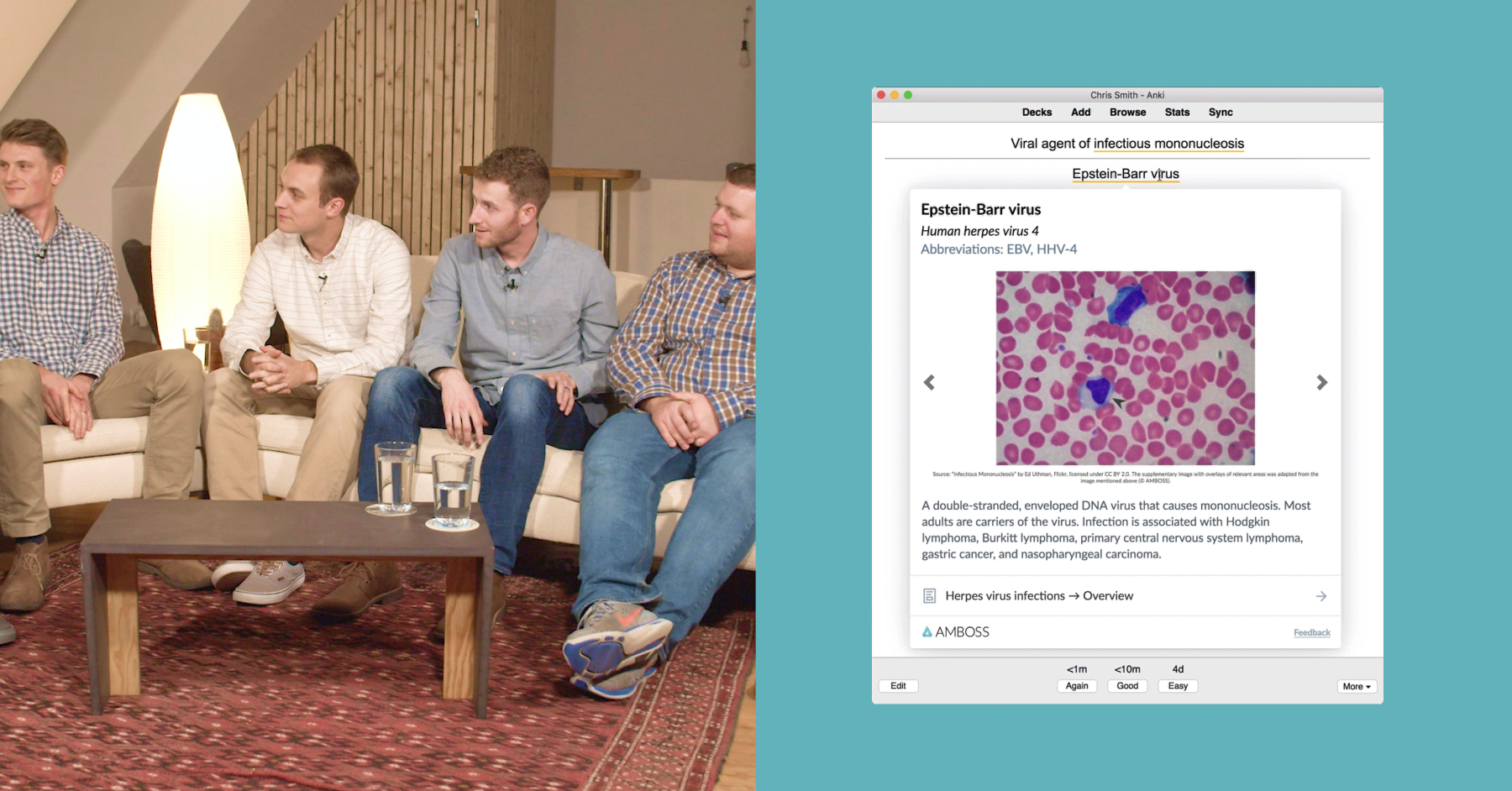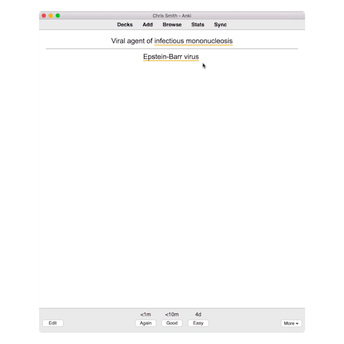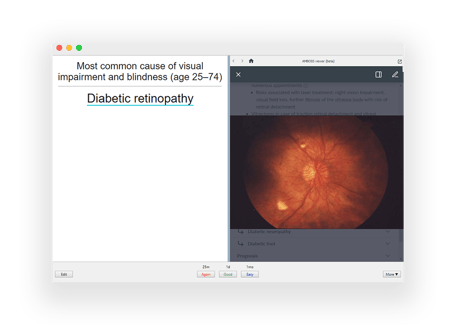A Letter From The AnKing: How to Master Anki

Dear future doctor,
Congratulations on your acceptance to medical school! You’re about to embark on an incredible journey and I’m excited to share a few tips that will help you through your first year and beyond.
Looking back on my experience, I have found that the greatest challenge of medical school is, unquestionably, information overload. Not only are you required to retain countless facts in a very limited time, but you also have to sift through hundreds of resources to help you learn them all.
My goal with this article is to help you navigate the challenge of information overload efficiently so you can get ahead and focus on excelling in school rather than merely surviving.
The topics we’ll cover include:
- How to retain the information you learn
- The secret to avoiding cramming in medical school
- Applying your knowledge
- The AMBOSS add-on for Anki
- How to get started with Anki
Before we dive in, I'd like to introduce myself so you know why you should consider taking my advice. As a third-year medical student, I have been in your shoes! The methods that allowed me to succeed are not outdated and directly apply to you. If that doesn’t sound convincing yet, ask your friends and mentors about me. Amongst medical students, I’m better known as The AnKing.
Now, let’s dive into my top three tips that will help you excel in medical school.
Conceptualize, don't memorize
During your undergraduate degree (or back in high school), it’s likely that you, along with everyone else, fell into a routine of cramming for your exams. While this obviously worked and you made it into medical school, I’m sure it was often stressful. I know this was the case for me.
While you could continue like this in medical school and likely pass your smaller examinations, doing this for cumulative finals and board exams is next to impossible, there’s simply too much information to retain. With that in mind, I'd like to recommend a method that will allow you to never cram again—including for your board exams! This has been crucial for my well-being and allowed me to score in the top 5% of my class.
Let’s call this the “Spider Web Method”. Your brain creates memories like a spider web. Our minds don't place pieces of information in isolation. The details we learn are naturally linked to memories, senses, and emotions. When something touches a spider’s web, vibrations are sent rippling through the cords, notifying the spider of activity. Similarly, as you come across familiar information, it should resonate with other interconnected pieces of your memory. This is why memorization alone is not an effective learning tool; it is working against the natural inclination of your brain!
So, how do you conceptualize instead of memorize? You use flashcards and visualize bits of information as an interconnected web. Let me provide an example from my own medical school experience:
Cystic fibrosis was a disease presented to us many times in the first few months of medical school. It seems like a straightforward pathology on the surface. However, there are specific mutations that affect various cellular processes and produce opposing effects in different parts of the body. To remember all of the intricacies of this idea, we avoid simply memorizing the facts. Instead, when reviewing a related flashcard, we visualize this cystic fibrosis patient walking into our own clinic reporting the classic symptoms we’ve studied. We imagine the processes causing the patient's symptoms and then imagine providing treatment options. This connects each of the facts to a tangible and practical scenario, effectively conceptualizing the entire disease in a few seconds of mental visualization.
Spaced repetition through Anki
You're probably most eager to know how I avoid cramming in medical school. The answer is spaced repetition. The idea behind spaced repetition is to continually review the information just before it would normally be forgotten. This allows you to study the least amount possible, while still retaining everything from day one.
Think about it this way: You study a topic in a flashcard today, then tomorrow, then in three days, then in seven days, then in a few weeks, then in a few months, and so forth. 1.5-2 years later when you’ll take Step 1, you still remember everything from day 1 of medical school because you have been reviewing it continually!
But how do you do this for every little fact that you study? Enter Anki. Anki is an open-sourced, free flashcard software that has a highly effective spaced repetition algorithm built into the platform. As long as you review all the flashcards Anki tells you to on every day, you can be confident that you’ll remember the information you previously learned.
For medical students, it just gets better. There is an incredible premade flashcard deck that contains nearly everything you need to know to excel on Step 1 and Step 2. Get it here.
When I started medical school, I was told by an MS3 that if I dedicated myself to doing those flashcards every day, I could score in the top 10% on Step 1. Two years later, I found myself telling new M1s the EXACT. SAME. THING. Because it worked.
The biggest caveat is that you have to use Anki correctly. That’s why we started a YouTube channel and now a full online mastery course. See below for more details on these!
Apply what you learn
Medical school will push you to not only learn but apply the knowledge that you’ve learned. As an MS1, you'll see this most completely in your multiple-choice exams but, as you progress through your career, this will transition to caring for actual patients. Either way, you will be pushed to apply your knowledge.
The best way to prepare for these situations is through practice. This is where all those question banks you've heard about coming into play and, by far, our favorite one is AMBOSS.
With the AMBOSS Qbank, you can dive into thousands of questions that will prepare you for your exams and allow you to practice applying your knowledge. What’s more, after a Qbank session, you’ll be able to see an analysis of your performance and they’ll give you study recommendations.
Bonus tip: Get the free AMBOSS add-on for Anki
The brilliant folks at AMBOSS created a free Anki add-on that adds superpowers to Anki and helps you make those spider web connections I wrote about earlier. Here are two things I love the most about this:
- Quickly look up a definition with a pop-up dictionary

- Read more about a topic - right inside Anki

Get the free AMBOSS-Anki add-on here.
Getting started
The first thing to do is download Anki and the AMBOSS-Anki add-on.
We’ve partnered with AMBOSS to offer a special 10% discount for you! Just use the code AMBOSSMED at the time of checkout!
Then you can dive into Anki Palace and the Anki Mastery Course.
The Anki Mastery Course was built by the AnKing team so that you can understand the intricacies of Anki to maximize your study time. From personal experience, it took many of us about six months to understand the potential Anki has for managing the information overload of medical school. Our goal in creating this course is to give time back to students, minimize frustrations with learning resources, and master content for examinations without the anxiety and stress that comes with cramming.
You can even become a member of AnkiPalace. We know it’s not always easy to get started so we provide individualized help, priority early access to our content, live Q&A sessions, and many more perks.
We believe that the content we provide you, in conjunction with Anki and AMBOSS, will facilitate your success in medical school now and as a doctor down the road.
We offer you our most sincere congratulations on this exciting new chapter in your life! We have the utmost confidence in you and in your capacity as a physician. Best of luck!
Sincerely,
The AnKing
